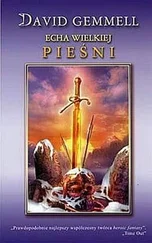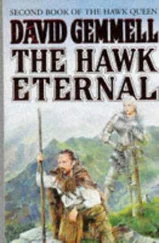'You are coming across the water with me?'
'Of course. I promised your mother I'd see you safe all the way to Stone.'
'I'll be safe,' said Banouin, feeling suddenly uncomfortable. 'I don't think you'll like Stone.'
'If I don't I shall bid you farewell,' said Bane. 'Anyway, I'm tired. I think I'll get some sleep.' Rising smoothly he wandered back to the cave.
Banouin sat alone for a while, lost in thought. He loved Bane, but the thought of arriving in Stone with him was a daunting and depressing one. Like taking a wild bear to a wedding dance. The thought shamed him, but he could not push it away.
Bane lay in the cave, trying to deal with the now familiar waves of sorrow, and seeking a way through the desolation he felt. Parax had been right. He had planned to lead the hunters a merry chase, and then go down fighting, putting an end to this bitter existence. Bane had not consciously realized it, and only when Parax had spoken the words had the truth of them registered. It was not that he particularly wanted to die. He loved life, the feel of the warm sun on his face, the sound of a waterfall, the call of a hunting falcon. Nor was it merely the death of Arian, or the continuing hurt of his rejection by Connavar.
Rather it was a combination of these and many other pressures, not least the sense of isolation following the early years of being shunned by his fellows, and then, as he grew older, being offered only menial tasks because he could not master the relatively simple skills of reading and writing. It was almost as if the king had decreed this onerous duty on the peoples of the Rigante, Pannone and Norvii merely to add to the already unbearable pressures of Bane's life.
He lay back in the cave and felt his anger rising. Vorna had probably saved his life by asking him to look after her son. And now that son, Bane's only friend, was ashamed of him. He had seen the look in his eye when he talked of accompanying him to Stone, the sudden shock and dismay. He did not let Banouin know that he had seen it, and it hurt the more because he had to hide his pain.
But then he had always hidden the pain. When have you ever let people see the real man? he wondered. When have you ever let fall the mask? Cheerful Bane, bright Bane, Bane the storyteller, the singer of bawdy songs. In other settlements but Three Streams Bane was popular with all he met, but the man they laughed and joked with was not the man behind the mask.
Even with his mother Bane hid his feelings. She had anguish enough, he had thought, and so he joked and laughed with her. No-one else could bring a smile to her face. No-one else really tried.
Now she was gone. Even Vorna's skills had not been enough to save her. This had confused Bane, for Vorna had taken the cancer from the blind badger and restored its sight, and Bane had railed at her.
'Magic alone was not enough,' Vorna had said. 'Arian no longer had the will to go on.'
Bane understood it now. He had felt it for himself, up in the hills as the hunters searched.
He felt it now in this cold cave.
Thoughts of Arian filled his mind. When, he wondered, had she finally lost the will to live? Often she would walk the high hills, staring towards the north. Bane always believed she was waiting for Connavar, hoping he would one day ride by, and that he would stop and talk to her. He never did.
Two years ago, at fifteen, Bane had decided to meet with the king – meet with him in a way that would force Connavar to speak with him. And when they spoke Bane would ask him why he shunned them. The plan was simple enough. All Bane had to do was win the Beltine Race, five miles over rough country. The problem was that there were at least seven other youngsters faster than he among the Rigante of Three Streams alone.
So Bane trained every day for months, building his stamina, pounding along mud-covered trails, running up high hills, pushing himself to the point of collapse. In the early weeks he would sometimes stagger to a halt and vomit beside the trail. Then he would run on, lungs afire, muscles burning. Gradually he became stronger, driven on always by the thought of meeting his father, seeing at last pride in his eyes.
The race had been hard fought. One boy from the Northern Pannone had stayed with him for four of the five miles, but Bane had powered away from him in the last mile, finishing fast and sprinting towards the feast fires at the foot of Old Oaks. The last two hundred paces had been run between lines of cheering tribesmen, and at the finish he saw the king, standing alongside his brothers Braefar and Bendegit Bran.
Connavar was a big man, wide in the shoulder. He was wearing his famous patchwork cloak, bearing the colours of the five tribes, and at his side was the legendary Seidh sword that men said could cut through stone and iron.
Heart pounding, lungs close to bursting, Bane had slowed at the finish, then stood, hands on hips, staring into the eyes of the king. It was like looking into his own eyes, and their gaze met and locked. There was no expression on Connavar's scarred features, and he did not smile. He stepped forward and said: 'Well done.' Then he turned away before the breathless Bane could answer, and strode back through the crowd.
For a moment there was silence in the crowd, then Bendegit Bran stepped forward, and put his arm round Bane's shoulder. 'The champion is from Three Streams,' he shouted. He patted Bane on the shoulder. 'That was a fine run.' The crowd cheered again and Bran led Bane away as the other runners started to pound down towards the line.
'Are you all right?' asked Bran.
Bane had looked into his uncle's handsome face and nodded. 'Just tired,' he said, looking beyond him at the distant figure of Connavar, walking up the hill path towards Old Oaks. 'Is the king not staying for the feast?'
Bran looked embarrassed. 'He is a solitary man. He rarely stays among crowds for long.'
'Last year I heard he sat the winner of the race beside him at table,' said Bane.
'Then you shall sit beside me this year,' said Bran.
'I think I'll go home,' Bane had replied.
'That's a two-day ride, Bane. Stay. Enjoy the feast.'
Bane had walked away, saddled the borrowed pony, and set off into the darkness.
Eighteen months later, when he fought his first skirmish against the Sea Raiders, killing two and wounding a third, he had been awarded the gold clasp he still wore on his wrist. It was a tradition that these were given out by the king. Bane had received his from Braefar. It was no surprise by then.
It was around this time that Arian began to fade. She ate like a sparrow, and the weight dropped from her. Even Bane could no longer make her smile.
Bane pulled his blanket around him and rolled to his side, resting his head on his saddle. He heard Banouin's soft footfalls as he entered the cave, but kept his eyes closed.
I will see you safely to Stone, he thought, and when the walls of the city are in sight I will say farewell.
The wagon trundled on through the driving rain, the two weary horses moving slowly, heads down against the wind. The driver sat huddled below the canvas canopy, his right hand holding the reins, his left arm round the shoulders of the teenage girl beside him.
Despite the canopy the rain had soaked them both, and the girl shivered. 'How long, Father?' she asked.
'According to the map we're about a mile from the bridge,' the old man told her. 'After that maybe five miles. We should be there before dusk.'
He smiled as he said it. The sky was so dark now it already felt like night. Appius lifted his whip and cracked it over the heads of the team. They surged into the traces and the wagon picked up speed. His daughter snuggled in close. He patted her back and, reaching over, tugged her hood forward to try to protect her from the rain. The hood was already drenched. She looked up at him and smiled. His heart leapt. So like her mother, he thought. So beautiful.
Читать дальше












